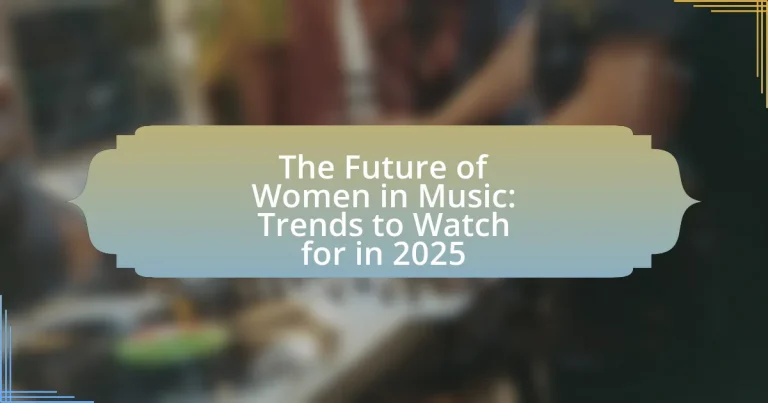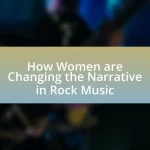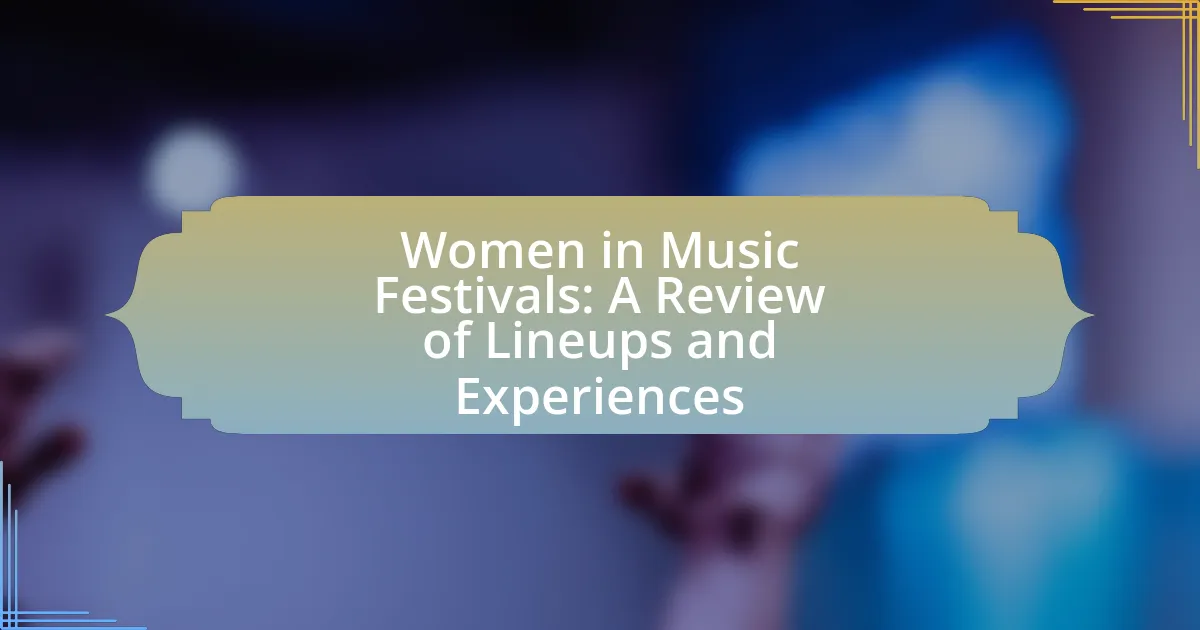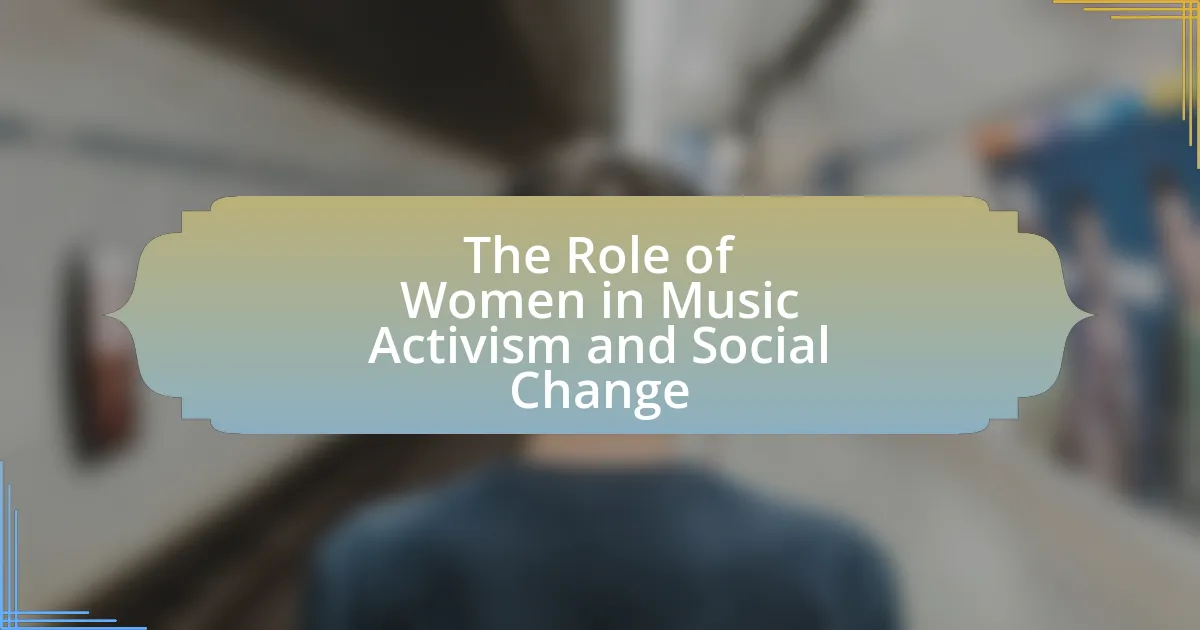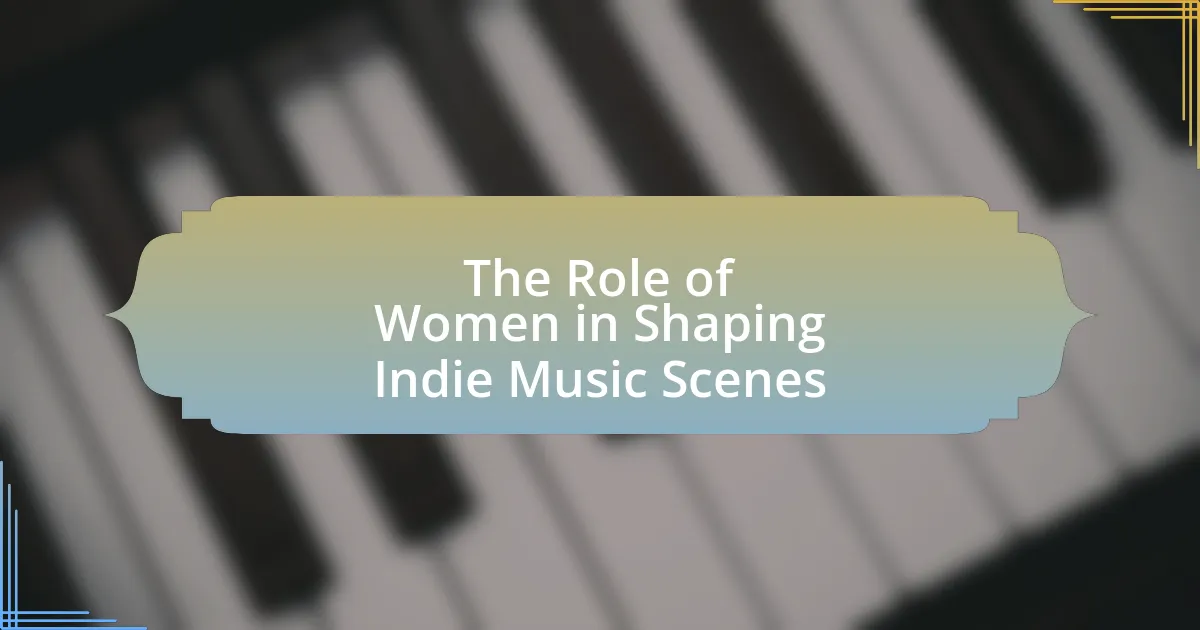The article examines the evolving landscape for women in music as we approach 2025, highlighting key trends such as increased representation in leadership roles, genre diversity, and a focus on mental health. It discusses how female artists are shaping the industry through innovative artistry and leadership, while also addressing the challenges they face, including gender inequality and systemic barriers. The piece emphasizes the impact of technology and digital platforms in empowering women, as well as the importance of networking and mentorship for career advancement. Predictions for 2025 suggest a significant increase in female representation and leadership within the music industry, driven by ongoing advocacy and initiatives aimed at promoting gender equality.
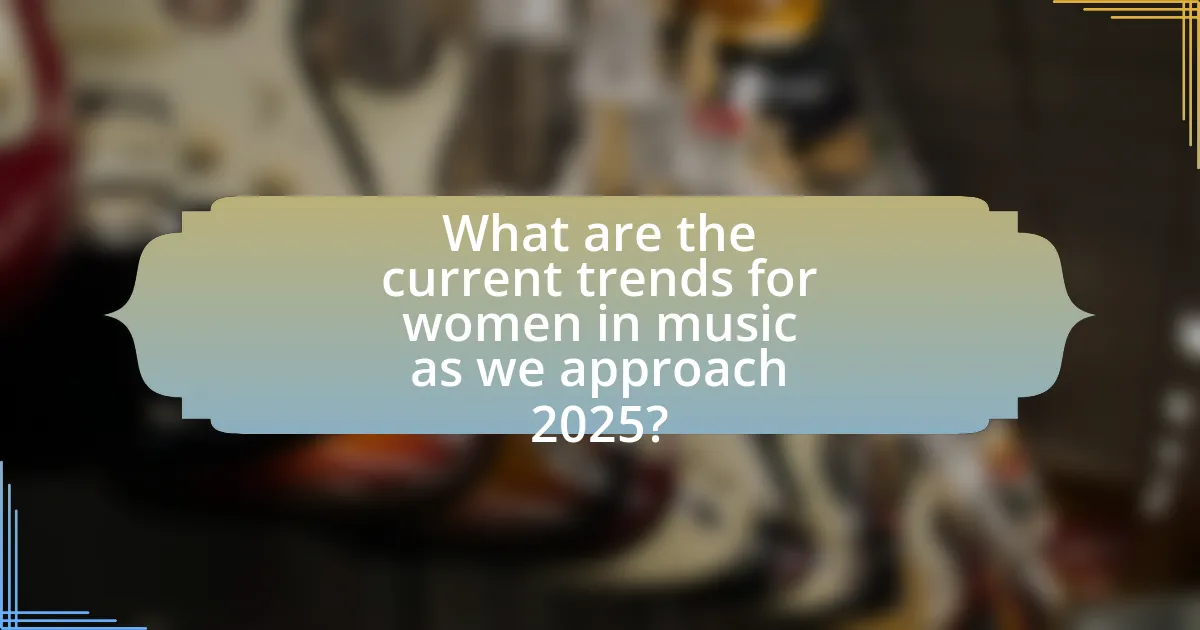
What are the current trends for women in music as we approach 2025?
Current trends for women in music as we approach 2025 include increased representation in leadership roles, a rise in genre diversity, and a focus on mental health and well-being. Women are increasingly occupying executive positions in record labels and music organizations, contributing to a more equitable industry. Additionally, female artists are exploring a wider range of genres, from hip-hop to electronic music, reflecting a shift towards inclusivity. Mental health awareness is also becoming a priority, with many artists advocating for self-care and support systems within the industry. These trends are supported by data showing a growing number of women in top-charting positions and leadership roles, indicating a significant cultural shift.
How are women shaping the music industry today?
Women are significantly shaping the music industry today through increased representation, leadership roles, and innovative artistry. Female artists like Billie Eilish and Taylor Swift are not only dominating charts but also influencing industry standards regarding creative control and business practices. According to the 2022 report by the Annenberg Inclusion Initiative, women accounted for 23.3% of artists on the Billboard Hot 100, a notable increase from previous years, indicating a shift towards greater visibility. Additionally, women are taking on executive positions in major record labels, with figures like Sylvia Rhone leading Epic Records, which further drives diversity and inclusivity in decision-making processes. This transformation is fostering a more equitable environment in the music industry, paving the way for future generations of female musicians and leaders.
What roles do women occupy in various music genres?
Women occupy diverse roles in various music genres, including performers, songwriters, producers, and industry executives. In pop music, women often serve as lead vocalists and choreographers, exemplified by artists like Beyoncé and Taylor Swift, who not only perform but also write and produce their own music. In rock, women such as Joan Jett and Paramore’s Hayley Williams have made significant contributions as frontwomen and songwriters, challenging gender norms in a traditionally male-dominated genre. In hip-hop, female artists like Nicki Minaj and Cardi B have emerged as influential figures, both as performers and as business moguls, reshaping the landscape of the genre. Additionally, women are increasingly taking on roles behind the scenes, with a growing number of female producers and sound engineers, such as Linda Perry and Sylvia Massy, who have made notable impacts in their respective fields. This trend reflects a broader movement towards gender equality in the music industry, as evidenced by initiatives aimed at increasing female representation in all aspects of music production and performance.
How has the representation of women in music evolved over the years?
The representation of women in music has evolved significantly from the early 20th century to the present day, transitioning from predominantly male-dominated genres to a more balanced and diverse landscape. In the 1920s and 1930s, women like Bessie Smith and Billie Holiday began to gain recognition, yet they often faced limitations in creative control and industry support. By the 1960s and 1970s, artists such as Aretha Franklin and Janis Joplin challenged societal norms, paving the way for greater visibility and influence.
In recent decades, the rise of female artists across various genres, including pop, rock, hip-hop, and country, has been marked by increased representation in mainstream media and award shows. For instance, in 2020, women accounted for 27% of nominees at the Grammy Awards, a notable increase from previous years. Furthermore, the #MeToo movement has prompted discussions about gender equality in the music industry, leading to initiatives aimed at supporting female artists and addressing systemic issues.
Overall, the evolution of women’s representation in music reflects broader societal changes, with ongoing efforts to achieve parity and recognition for female musicians.
What challenges do women in music face as we look towards 2025?
Women in music face significant challenges as we look towards 2025, including gender inequality, lack of representation, and systemic barriers within the industry. Gender inequality persists, with women often receiving less recognition and fewer opportunities compared to their male counterparts; for instance, a 2021 report by the Annenberg Inclusion Initiative found that only 22.4% of artists on the Billboard Hot 100 were women. Additionally, women are underrepresented in key decision-making roles, such as producers and executives, which limits their influence in shaping the industry. Systemic barriers, including harassment and discrimination, continue to hinder women’s progress, making it difficult for them to thrive in a competitive environment. These challenges highlight the need for ongoing advocacy and structural changes to promote equity in the music industry by 2025.
What barriers exist for women in achieving leadership roles in the music industry?
Barriers for women in achieving leadership roles in the music industry include gender bias, lack of representation, and limited access to networking opportunities. Gender bias manifests in hiring practices and promotion decisions, often favoring male candidates over equally qualified female candidates. According to a 2021 report by the Annenberg Inclusion Initiative, women held only 21.6% of leadership roles in the music industry, highlighting the significant underrepresentation. Additionally, women often face challenges in building professional networks, which are crucial for career advancement, as many industry events and opportunities are male-dominated. These factors collectively hinder women’s progress into leadership positions within the music sector.
How do societal perceptions impact women’s careers in music?
Societal perceptions significantly impact women’s careers in music by shaping opportunities, representation, and industry standards. For instance, women often face stereotypes that question their musical abilities or prioritize their appearance over talent, which can limit their access to roles in production, songwriting, and performance. According to a 2020 report by the Annenberg Inclusion Initiative, women comprised only 21.7% of artists in popular music, highlighting the disparity in representation. Furthermore, societal expectations can lead to a lack of support for women pursuing careers in genres traditionally dominated by men, such as rock or hip-hop, thereby influencing their career trajectories and success rates.
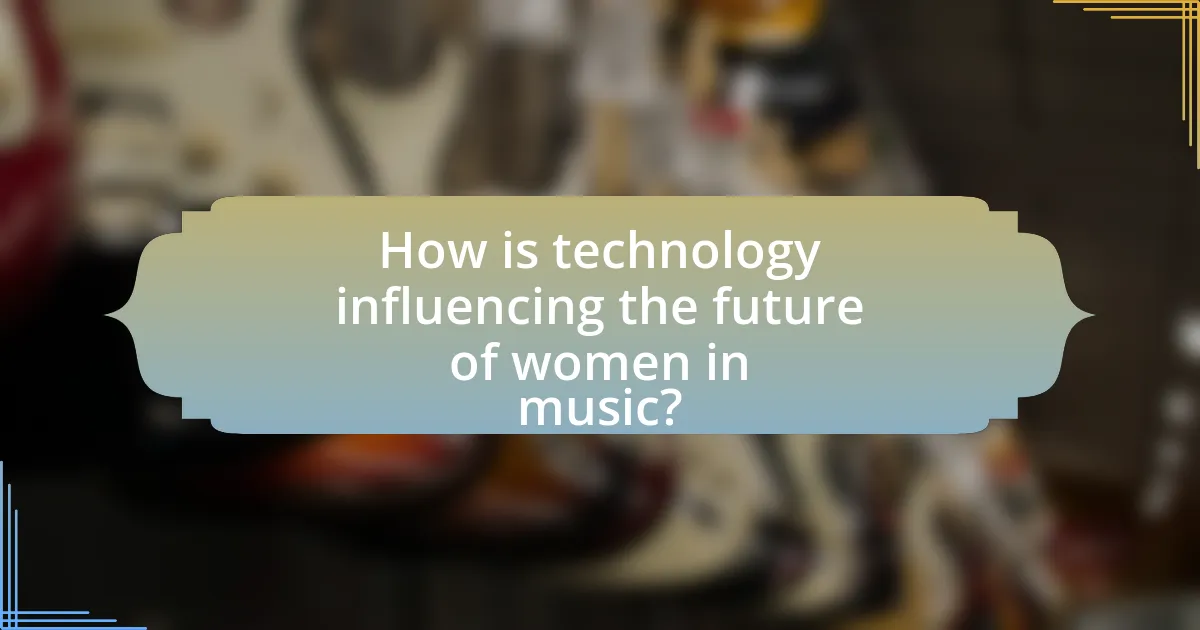
How is technology influencing the future of women in music?
Technology is significantly influencing the future of women in music by providing new platforms for creativity, collaboration, and distribution. Digital tools such as music production software and social media enable female artists to create high-quality music independently, reducing reliance on traditional record labels. For instance, platforms like SoundCloud and Bandcamp allow women to share their work globally, leading to increased visibility and opportunities. Additionally, data from the 2021 Women in Music report by the Annenberg Inclusion Initiative indicates that women are increasingly represented in music production roles, with technology facilitating their entry into these positions. This shift not only empowers women but also diversifies the music industry, fostering a more inclusive environment.
What technological advancements are empowering female artists?
Technological advancements such as digital distribution platforms, social media, and music production software are empowering female artists by providing them with greater access to audiences and resources. Digital distribution platforms like Spotify and Apple Music allow female artists to release their music independently, bypassing traditional gatekeepers in the industry. Social media platforms enable them to build personal brands and connect directly with fans, fostering community and support. Additionally, advancements in music production software, such as Ableton Live and Logic Pro, have made it easier for female artists to create high-quality music from home, reducing the need for expensive studio time. These tools collectively enhance visibility, creative control, and economic opportunities for female musicians.
How are digital platforms changing the landscape for women in music?
Digital platforms are significantly empowering women in music by providing greater access to distribution, promotion, and audience engagement. These platforms, such as Spotify, YouTube, and social media, enable female artists to share their work directly with listeners, bypassing traditional gatekeepers like record labels. For instance, a report by the Music Industry Research Association in 2021 indicated that women artists gained a 20% increase in visibility on streaming platforms compared to previous years. Additionally, social media allows women to build personal brands and connect with fans, fostering a supportive community that enhances their visibility and opportunities in the industry.
What role does social media play in promoting female musicians?
Social media plays a crucial role in promoting female musicians by providing them with platforms to reach wider audiences and engage directly with fans. This democratization of music promotion allows female artists to showcase their work without relying solely on traditional industry gatekeepers. For instance, platforms like Instagram and TikTok have enabled numerous female musicians to gain significant followings and achieve viral success, exemplified by artists such as Olivia Rodrigo and Doja Cat, who leveraged these platforms for their breakout hits. Additionally, social media facilitates community building among female musicians, fostering collaboration and support networks that enhance visibility and opportunities within the industry.
How can women leverage technology for their careers in music?
Women can leverage technology for their careers in music by utilizing digital platforms for distribution, promotion, and collaboration. For instance, platforms like Spotify and SoundCloud allow women to share their music globally, reaching wider audiences without traditional gatekeepers. Additionally, social media channels such as Instagram and TikTok enable women to build personal brands and engage directly with fans, which is crucial for career growth.
Moreover, technology facilitates access to music production tools, such as software like Ableton Live and GarageBand, empowering women to create high-quality music independently. According to a 2021 report by the Annenberg Inclusion Initiative, women accounted for only 21.6% of artists in popular music, highlighting the need for increased representation and the potential for technology to bridge this gap. By embracing these technological advancements, women can enhance their visibility, creativity, and overall impact in the music industry.
What tools and resources are available for women to enhance their music production skills?
Women can enhance their music production skills through various tools and resources, including digital audio workstations (DAWs) like Ableton Live, Logic Pro, and FL Studio, which provide comprehensive platforms for music creation. Additionally, online courses from platforms such as Coursera, Skillshare, and MasterClass offer structured learning paths taught by industry professionals, enabling women to gain technical skills and industry insights.
Furthermore, organizations like Women in Music and She Is the Music provide networking opportunities, mentorship programs, and workshops specifically designed to support women in the music industry. These resources collectively empower women to develop their music production capabilities and foster a supportive community.
How can women use online communities to support each other in the music industry?
Women can use online communities to support each other in the music industry by sharing resources, networking opportunities, and mentorship. These communities facilitate collaboration, allowing women to exchange knowledge about industry trends, promote each other’s work, and provide emotional support. For instance, platforms like Facebook groups and forums specifically for women in music have seen increased engagement, with studies indicating that women who participate in such networks report higher levels of confidence and career advancement. Additionally, initiatives like She Is The Music and Women in Music have been established to empower women through advocacy and education, demonstrating the effectiveness of collective support in overcoming industry challenges.
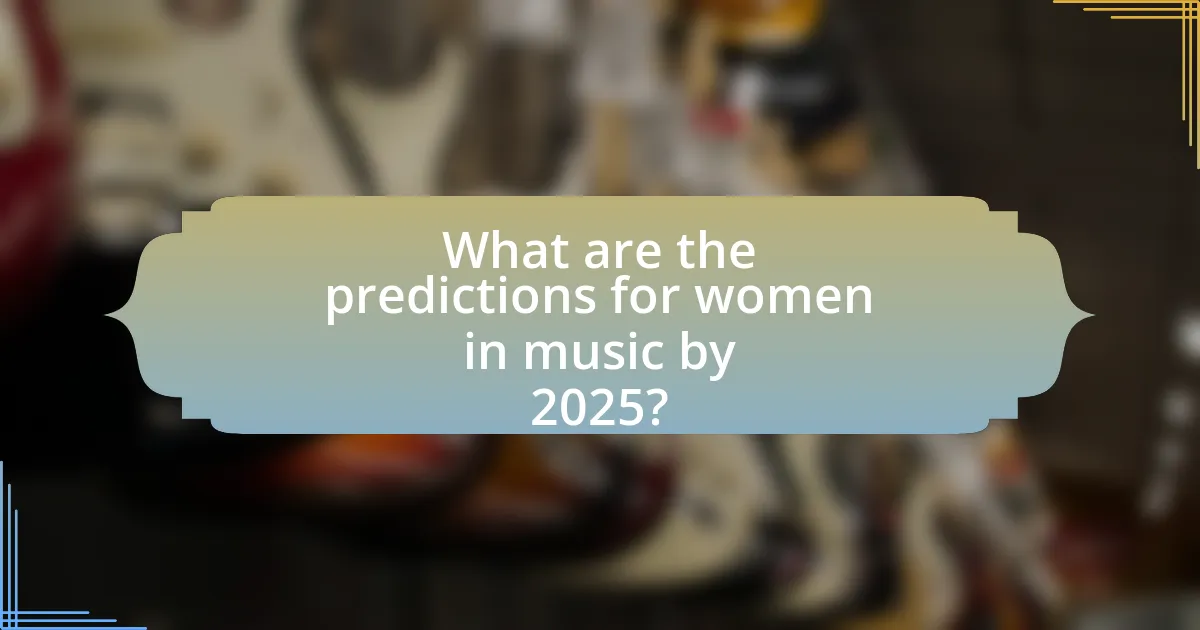
What are the predictions for women in music by 2025?
By 2025, predictions indicate that women will occupy a more prominent role in the music industry, with expectations of increased representation in leadership positions and a rise in female artists achieving commercial success. Data from the 2021 USC Annenberg Inclusion Initiative revealed that women comprised only 21.6% of artists in popular music, but initiatives aimed at promoting gender equality are likely to enhance this figure significantly. Furthermore, industry reports suggest that the number of women in executive roles at record labels and music companies will increase, driven by advocacy for diversity and inclusion. This shift is expected to foster a more equitable environment, leading to a broader range of female voices and perspectives in music by 2025.
How will the representation of women in music evolve by 2025?
By 2025, the representation of women in music will significantly increase, driven by industry initiatives and societal demand for diversity. Data from the 2021 USC Annenberg Inclusion Initiative indicated that women comprised only 21.6% of artists in popular music, but ongoing efforts such as mentorship programs and equitable hiring practices are expected to enhance this figure. Furthermore, the rise of female-led music festivals and platforms dedicated to showcasing women artists will contribute to a more balanced representation. As a result, by 2025, women are projected to occupy a larger share of prominent roles in music, both in performance and production, reflecting broader cultural shifts towards gender equality.
What initiatives are being implemented to support women in music?
Various initiatives are being implemented to support women in music, including mentorship programs, funding opportunities, and advocacy for gender equality in the industry. Organizations like Women in Music and She Is The Music provide resources and networking opportunities to empower female artists and industry professionals. Additionally, festivals and awards are increasingly recognizing and promoting female talent, with statistics showing that events featuring diverse lineups see higher attendance and engagement. These initiatives aim to create a more inclusive environment and address the historical underrepresentation of women in music.
How will industry policies change to promote gender equality in music?
Industry policies will change to promote gender equality in music by implementing stricter diversity quotas and funding initiatives aimed at supporting female artists. For instance, organizations like the Recording Academy have begun advocating for policies that require a certain percentage of female representation in award nominations and industry panels. Additionally, research from the Annenberg Inclusion Initiative highlights that only 22% of artists in popular music are women, prompting calls for policies that ensure equitable opportunities and resources for female musicians. These changes aim to create a more inclusive environment that addresses historical disparities in the music industry.
What can aspiring female musicians do to prepare for the future?
Aspiring female musicians can prepare for the future by developing a strong online presence and networking within the industry. Establishing a robust social media profile allows musicians to showcase their work, engage with fans, and connect with industry professionals. According to a 2021 report by the Music Industry Research Association, 70% of music consumers discover new artists through social media platforms, highlighting the importance of digital visibility. Additionally, participating in workshops, mentorship programs, and collaborations can enhance skills and expand professional networks, which are crucial for career advancement in the evolving music landscape.
What skills should women focus on developing for success in the music industry?
Women should focus on developing skills in music production, networking, and digital marketing for success in the music industry. Mastering music production allows women to create high-quality recordings and understand the technical aspects of sound, which is crucial in a competitive market. Networking skills enable women to build relationships with industry professionals, facilitating collaborations and opportunities. Additionally, proficiency in digital marketing is essential, as it helps women promote their music effectively across various platforms, reaching wider audiences. According to a 2021 report by the USC Annenberg Inclusion Initiative, women represent only 21.6% of artists in popular music, highlighting the need for women to equip themselves with these skills to enhance their visibility and success in the industry.
How can networking and mentorship benefit women in music?
Networking and mentorship can significantly benefit women in music by providing access to industry connections and guidance that can enhance their careers. Through networking, women can build relationships with established professionals, which can lead to collaboration opportunities, increased visibility, and access to resources that are often crucial for career advancement. Mentorship offers personalized support, helping women navigate challenges specific to the music industry, such as gender bias and representation issues. Research indicates that women with mentors are more likely to achieve leadership roles and experience career satisfaction, as mentorship fosters skill development and confidence. For instance, a study by the Women’s Audio Mission found that women who participated in mentorship programs reported a 50% increase in their professional opportunities.
What are the best practices for supporting women in music moving forward?
To support women in music moving forward, it is essential to implement mentorship programs that connect emerging female artists with established professionals in the industry. These programs can provide guidance, networking opportunities, and resources that are crucial for career development. Research indicates that mentorship significantly increases the likelihood of success for women in male-dominated fields, including music, where only 21% of artists are women according to the 2021 USC Annenberg Inclusion Initiative. Additionally, promoting equitable hiring practices and ensuring representation in decision-making roles within music organizations can create a more inclusive environment. Studies show that diverse teams lead to better creativity and innovation, which can benefit the music industry as a whole. Lastly, creating platforms that amplify women’s voices and stories, such as festivals, awards, and media coverage, can help to challenge stereotypes and inspire future generations of female musicians.
